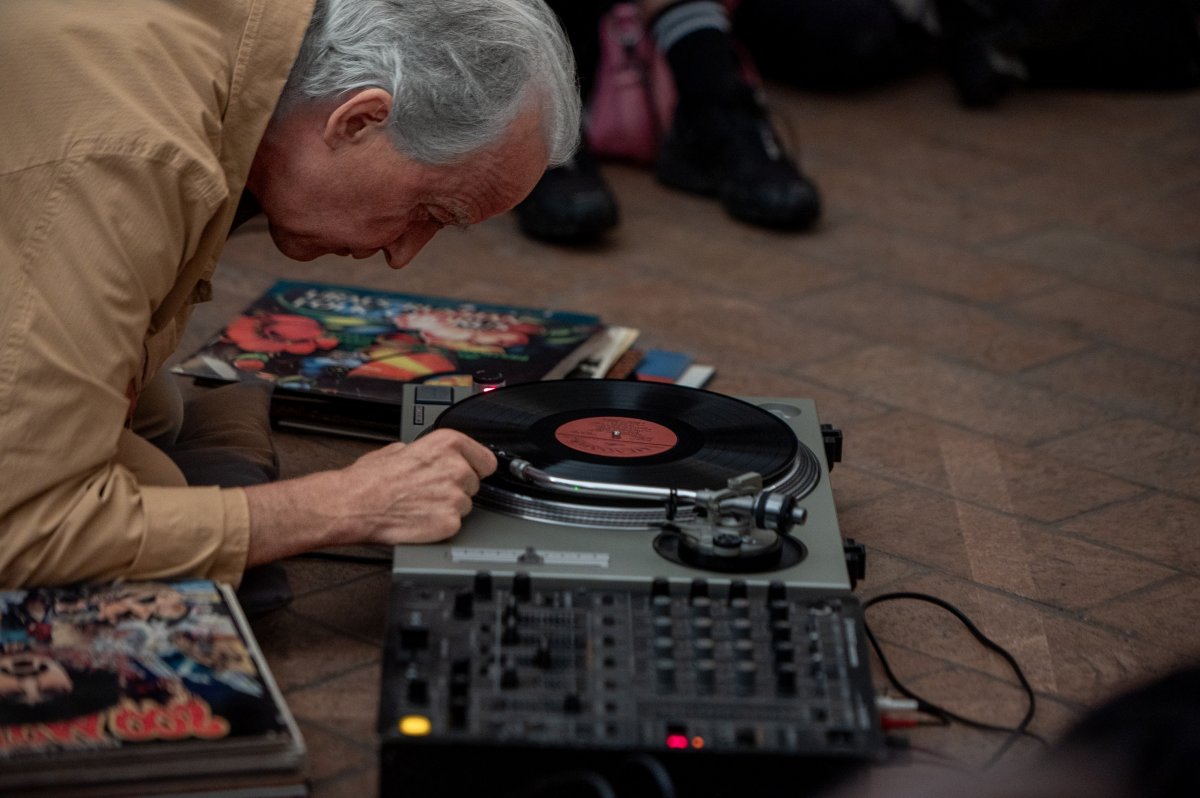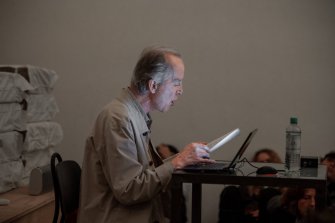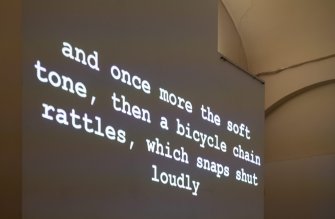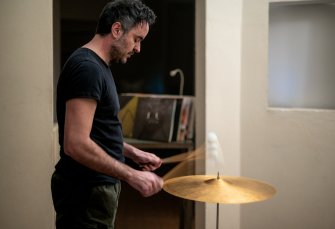Weiss/Weisslich
Peter Ablinger, Enrico Malatesta
Giovedi 9 novembre 2023 Xing ha presentato a Raum Weiss/Weisslich, una serata con il compositore austriaco Peter Ablinger, per la prima volta a Bologna, affiancato dal musicista e ricercatore sonoro Enrico Malatesta, che ha dato corpo con piatti e percussioni a due tra le sette composizioni in programma.
Il focus sulle pratiche dell’ascolto, che Ablinger ha forzato come linee di faglia aperte nella topografia dell'udibile, costituiva il secondo degli appuntamenti del BLANK SOUNDS Institute of Listening.
L'appuntamento di Bologna, incentrato sul ciclo Weiss/Weisslich, verteva sulla presentazione live di composizioni sonore, includendo fotografia visiva e acustica e musica senza suono, e apre una discussione estetica sul rumore e l’ascolto, sulla incommensurabilità di suono e linguaggio, su raddoppiamenti e tautologie (da qui Weiss/Weisslich: Bianco/Biancastro) che caratterizzano il nostro rapporto col mondo.
Peter Ablinger è uno dei pochi artisti che utilizza il rumore senza caricarlo di alcun tipo di simbolismo: rumore non è significante di caos, energia, entropia, disordine o tumulto; né rappresenta l’opposto di qualcosa, un segno di disobbedienza o distruttività e nemmeno il sigillo di una totalità, dell'eternità o cose del genere. Tutto il lungo percorso di Ablinger è stato una messa in discussione della natura del suono, del tempo e dello spazio (le componenti solitamente ritenute centrali nella musica), rendendo dubbie convenzioni ritenute inconfutabili. Il lavoro di Ablinger ha coltivato un piano che investe i concetti di ripetizione e di monotonia, di riduzione e di ridondanza, di densità e di entropia. La sua vasta produzione di pezzi strumentali e elettronici, partiture e istruzioni, installazioni e opere concettuali, trova costantemente modi per mettere in dubbio l'organizzazione della realtà da parte dell'orecchio.
"ASCOLTARE FA BENE! In quale altro modo possiamo recidere il legame che ci accompagna attraverso le nostre vite, questo continuo pensare, questo dialogo interiore (esterno), questo nostro starci sempre appresso? Dove altro – se non nell’ ‘ascolto’? Si potrebbero considerare altri sensi o esperienze sensoriali: il palato, la degustazione del vino, quel momento in cui lo sguardo si volge verso l'interno e tutta l'attenzione è rivolta alla lingua... o il sesso... o una doccia fredda e un tuffo in un lago... o un improvviso dolore, bruciarsi col fuoco... Questi esempi sembrano ridurre la cesura di quei legami a un breve istante – nel caso del sesso al momento dell'orgasmo, la piccola morte, come una volta veniva chiamato. Quando invece la durata dell’interruzione sembra più controllata, come nel caso della degustazione o dell’ascolto, il pensiero non è realmente sospeso. Più esperienza e conoscenza abbiamo sul vino, più appagante sarà la degustazione. Qualcosa di simile vale per l’ascolto. Pertanto, la differenziazione tra pensare e ascoltare è metaforica. ‘Pensare’ sta per qualcosa, e ‘ascoltare’ sta per qualcos’altro. Sono forme di essere-qui e di non-essere-qui.
Ascoltare significa (metaforicamente) ‘essere’ o ‘essere qui’; pensare significa (metaforicamente) ‘non essere’ o ‘essere altrove’. “Non c'è accesso cognitivo al reale se non attraverso le sue definizioni”, dicono i filosofi - eppure... l'obiezione meravigliosamente paradossale di Alenka Zupančič (... il suo pensiero contro un sistema esauribile, il suo esame filosoficamente rigoroso dell'assurdità, sulla commedia che risiede in ogni tentativo di formulare un sistema chiuso a chiave... la superiorità della ‘commedia’ rispetto a tutti i sistemi...) – eppure! ... assaggiare prima di rendersi conto di ciò che il gusto ricorda, ascoltare prima di assegnare una qualsiasi categoria – questo è sì ciò che si differenzia per definizione, ma è anche ciò che sconfina nell'ineffabile e si differenzia – più che ‘metaforicamente’ – dal pensare, ricordare, categorizzare, associare; e, in contrasto con queste ultime facoltà, ho la sensazione di ‘essere qui’, come qualcosa di ‘reale’, perché qui, e solo qui, mi sembra di confinare con qualcosa di diverso da me stesso, un fuori, forse un mondo. Qui, e solo qui, sento la freddezza e l'ignoranza del mondo nei miei confronti, ma sento anche l'unico momento di sovranità, di non essere imbrigliato da un ordine predeterminato. Eppure chiamare questo ‘libertà’ sembra assurdo. È la consapevolezza che non c'è scelta, o che non sono io a scegliere. I dadi sono stati lanciati da tempo, o sono caduti una volta per tutte. Osservare la caduta: questa è tutta la sovranità che abbiamo." (P.A.)
BLANK SOUNDS Institute of Listening è un'entità di carattere per-formativo al cui centro è situato l’ascolto inteso come pratica, esperienza e risorsa tra suono, spazio e movimento. E’ uno degli Istituti Nomadici aperti da Xing in epoca postpandemica in dialogo con importanti protagonisti della scena artistica contemporanea, con l’obbiettivo di costituire dei momenti di riflessione, studio, produzione e trasferimento di pratiche innovative nel campo delle Live Arts.
PROGRAMMA
Verdopplung 4.01 / Doubling 4.01 ("Plow and Greenfench")
mov-file, stereo
Weiss/Weisslich 20
cymbal
Verdopplung 4.02 / Doubling 4.02 ("Fruit and Ambulance")
fieldrecording and subtitles (mov-file, stereo)
The Real as Imaginary
voice and noise
Verdopplung 4.03 / Doubling 4.03 ("The Parrot")
fieldrecording and subtitles (mov-file, stereo)
Weiss/Weisslich 17c
snare drum and radio
30 Schallplatten / 30 records
records and record player, performance
***
Thursday 9 november 2023 Xing presented at Raum Weiss/Weisslich, an evening with the Austrian composer Peter Ablinger, for the first time in Bologna, accompanied by the musician and sound researcher Enrico Malatesta, who performed with cymbals and percussion two of the seven compositions on the programme.
The focus on listening practices, which Ablinger has been forcing like open fault lines in the topography of the audible, constituted the second of the autumn appointments of the BLANK SOUNDS Institute of Listening.
The event in Bologna, centered on the Weiss/Weisslich cycle, focused on the live presentation of sound compositions, including visual and acoustic photography and music without sound, and opens an aesthetic discussion on noise and listening, on the incommensurability of sound and language, on doublings and tautologies (hence Weiss/Weisslich: White/Whitish) that characterize our relationship with the world.
Peter Ablinger is one of the few artists today who uses noise without any kind of symbolism - not as a signifier for chaos, energy, entropy, disorder, or uproar; not for opposing something, or being disobedient or destructive; not for everything, for eternity, or for what-have-you. As in all these cases of music deliberately involving noise, noise is the case, but for Ablinger: this alone. Peter Ablinger has also come a long way in questioning the nature of sound, time, and space (the components usually thought central to music), and his findings have jeopardized and made dubious conventions usually thought irrefutable. These insights pertain to repetition and monotony, reduction and redundancy, density and entropy.His vast output of scores, electronic pieces, installations, and conceptual works consistently finds ways to put the ear’s organization of reality in doubt.
“LISTENING IS GOOD FOR YOU! Where else? Where else can we sever the bond that pulls us through our lives, this ‘thinking’, our internal (external) dialogue, our ‘tag-alongness’? Where else— besides in ‘listening’? One could consider other senses and sensory experiences: taste, wine-tasting, the moment our eyes turn inward and our whole attention is directed to the tongue ... sex ... a cold shower or a plunge into a lake ... sudden pain, burning oneself on a stove ... these last examples in particular seem to reduce the cutting of those tag-along bonds to a brief moment—in the case of sex to the moment of orgasm, the ‘little death’, as it was once called. On the other hand, when the duration of the interruption seems more controlled, as in the case of tasting or listening, thinking isn’t really switched off. The more experience and knowledge we have about wine, the more fulfilling the wine- tasting. Something similar applies to listening. Thus, the differentiation between thinking and listening is a metaphorical one. ‘Thinking’ stands for something, and ‘listening’ stands for something. They are forms of being-here and not-being-here.
Listening means (metaphorically) ‘being’ or ‘being here’; thinking means (metaphorically) ‘not being’ or ‘being elsewhere’. “There is no cognitive access to the real except via terms,” philosophers say -and yet.. Alenka Zupančič’s wonderfully paradoxical objection (... her precise thinking against a closed, terminable system, her philosophically stringent examination of absurdity, the comedy that dwells in all attempts at formulating a terminable system ... the superiority of “comedy” relative to all systems ...)— and yet! ... tasting before I realize what the taste reminds me of, listening before I assign any category—this is indeed what is differentiated by terms, but also what borders on the ineffable and differs—more than just ‘metaphorically’ from ‘thinking’, remembering, categorizing, associating; in contrast to these last qualities, it feels like ‘being here’, like something ‘real’, because here, and only here, I seem to border on something different from myself, an outside, a world perhaps. Here, and only here, I feel the coldness and ignorance of the world toward me; here I feel, too, the sole moment of sovereignty, of not being harnessed by a predetermined order. And yet, calling this ‘freedom’ seems absurd. It is the realization that there is no choice, or that it is not I who gets to choose. The dice have long been cast, or they have been falling all along. Watching them fall after the fact: that’s all the sovereignty we have.” (P.A.)
BLANK SOUNDS Institute of Listening is a per-formative form that focuses on listening as a practice, experience and resource crossing sound, space and movement. It is one of the Nomadic Institutes conceived by Xing in the post-pandemic era in dialogue with important protagonists of the contemporary art scene, with the aim of creating moments of reflection, study, production and transfer of innovative practices in the field of Live Arts.




